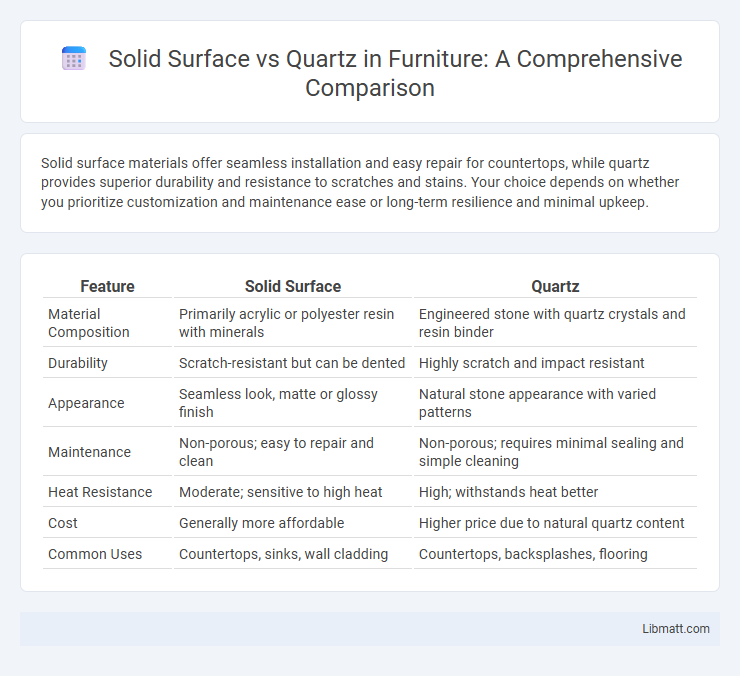Solid surface materials offer seamless installation and easy repair for countertops, while quartz provides superior durability and resistance to scratches and stains. Your choice depends on whether you prioritize customization and maintenance ease or long-term resilience and minimal upkeep.
Table of Comparison
| Feature | Solid Surface | Quartz |
|---|---|---|
| Material Composition | Primarily acrylic or polyester resin with minerals | Engineered stone with quartz crystals and resin binder |
| Durability | Scratch-resistant but can be dented | Highly scratch and impact resistant |
| Appearance | Seamless look, matte or glossy finish | Natural stone appearance with varied patterns |
| Maintenance | Non-porous; easy to repair and clean | Non-porous; requires minimal sealing and simple cleaning |
| Heat Resistance | Moderate; sensitive to high heat | High; withstands heat better |
| Cost | Generally more affordable | Higher price due to natural quartz content |
| Common Uses | Countertops, sinks, wall cladding | Countertops, backsplashes, flooring |
Introduction to Solid Surface and Quartz Countertops
Solid surface countertops are crafted from a blend of acrylic or polyester resins and natural minerals, offering a non-porous, seamless finish ideal for hygienic kitchen and bathroom environments. Quartz countertops combine approximately 90% engineered quartz with resins and pigments, creating an extremely durable, low-maintenance surface resistant to stains and scratches. Your choice between these materials depends on lifestyle needs, balancing quartz's superior hardness with the repairable, customizable nature of solid surfaces.
Material Composition: Solid Surface vs Quartz
Solid surface countertops are composed primarily of acrylic or polyester resins combined with natural minerals, offering a non-porous, seamless surface ideal for easy maintenance and repair. Quartz surfaces consist of approximately 90-95% natural quartz crystals bound with polymer resins, creating a durable, scratch-resistant, and highly resilient countertop option. The synthetic resin in solid surface materials allows for thermoforming and integrated sinks, while quartz's natural hardness provides superior resistance to chips and heat.
Appearance and Design Options
Solid surface materials provide seamless, matte finishes with the flexibility to create integrated sinks and curved designs, ideal for sleek, modern aesthetics. Quartz offers a wide range of vibrant colors and natural stone patterns with a polished, glass-like surface that enhances luxury and durability. Your choice depends on whether you prefer customizable, smooth matte looks or diverse, high-gloss natural stone appearances.
Durability and Strength Comparison
Solid surface countertops offer excellent resistance to impact and minor scratches due to their non-porous acrylic composition, making them durable for everyday use. Quartz surfaces, engineered from natural quartz minerals combined with resins, provide superior hardness and high resistance to heat, stains, and deep scratches, often outperforming solid surface in strength. Your choice depends on the balance between budget and the level of durability required for your space, with quartz generally favored for heavy-use areas requiring maximum resilience.
Maintenance and Cleaning Requirements
Solid surface countertops require regular cleaning with mild soap and water, and minor scratches can be easily sanded out, making maintenance straightforward. Quartz surfaces are non-porous and highly resistant to stains and bacteria, requiring only routine wiping with a damp cloth and mild detergent for upkeep. Your choice should consider how much daily maintenance you prefer, as quartz offers lower ongoing cleaning demands compared to solid surface materials.
Cost Differences Between Solid Surface and Quartz
Solid surface countertops typically cost between $35 to $65 per square foot, making them a more affordable option compared to quartz, which ranges from $50 to $150 per square foot. Installation expenses for both materials can vary, but quartz tends to have higher overall costs due to its durability and aesthetic appeal. Budget-conscious homeowners often choose solid surface for cost efficiency, while quartz remains a popular investment for long-term value and design versatility.
Installation Process and Considerations
Solid surface countertops feature seamless integration with thermoforming capabilities, allowing custom shapes and smooth joins ideal for curved designs, while their installation requires professional expertise to handle heat welding and precise fitting. Quartz countertops, composed of engineered stone, demand meticulous measurement and cutting to ensure proper alignment of pattern and joints during installation, often necessitating heavier support structures due to their density. Both materials require careful substrate preparation and level surfaces to prevent cracking or warping, with solid surface being more forgiving to minor imperfections compared to quartz.
Resistance to Stains, Scratches, and Heat
Solid surface countertops offer impressive resistance to stains and minor scratches due to their non-porous composition, which prevents absorption of liquids and allows easy cleaning. Quartz surfaces excel in scratch resistance because of their hard, engineered stone makeup, providing durability in high-traffic kitchen areas. Both materials withstand heat moderately well, but using trivets or hot pads is recommended to protect Your investment from potential thermal damage.
Environmental Impact and Sustainability
Solid surface materials often have a lower environmental footprint due to their longer lifespan and repairability, reducing waste over time. Quartz countertops, while durable, typically involve energy-intensive mining and manufacturing processes, contributing to higher carbon emissions. You can enhance sustainability by selecting solid surface options that incorporate recycled content and support eco-friendly production practices.
Choosing Between Solid Surface and Quartz: Key Factors
When choosing between solid surface and quartz countertops, consider durability, maintenance, and aesthetics. Quartz offers superior hardness and resistance to scratches and stains, making it ideal for high-traffic kitchens, while solid surface provides seamless joints and easy repairability. Your decision should align with your lifestyle needs and design preferences to ensure long-lasting satisfaction.
solid surface vs quartz Infographic

 libmatt.com
libmatt.com